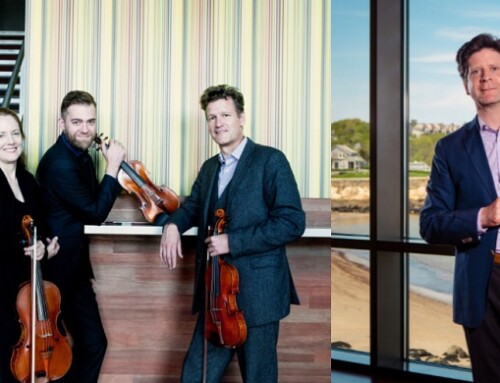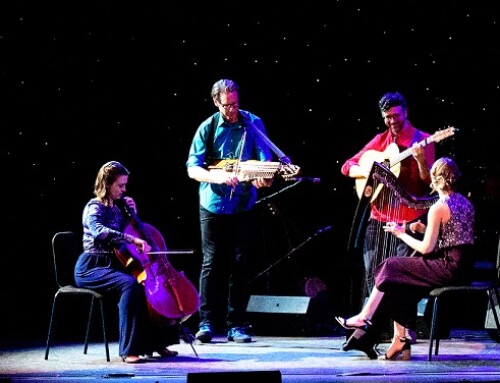by Christopher Blagg
With Rockport Music’s Concert View virtual music series rumbling on throughout the fall and into winter, we thought we would feature one concert in particular, the Dover Quartet, originally scheduled for November 20th will now be held on January 29th (in its place, Rockport Music will share a virtual concert from Boston-area folk artist Tim Gearan). The Dover, who RCMF Artistic Director Barry Shiffman calls “the hottest quartet on the scene today” and who has won both the Banff Competition and the Cleveland Quartet Award, will be performing Shostakovich’s Quartet No. 8 and Brahms’ Quartet in C Minor. To pique your interest, here’s a little context of these pieces.
The Shostakovich Quartet No. 8, written over three days in 1960, is shrouded in some mystery and controversy. Throughout his career Shostakovich always had a tenuous relationship with the Russian government, but this Quartet was the first piece written after he had reluctantly joined the Communist Party, a decision that was “something he had always resisted before and which, as he knew in advance, would be regarded as a betrayal by many of friends and colleagues” (Boosey & Hawkes). According to the score’s dedication, it was written for “the victims of fascism and the war,” but his daughter Galina has stated that the published dedication was imposed by the Russian authorities. The anguish caused by this fraught relationship with Khrushchev’s government bled into the piece. So much so that Shostakovich reportedly told a friend that the quartet “was essentially an obituary for himself” (Boosey & Hawkes). And yet, despite (or perhaps because of) this anguish, it remains one of Shostakovich’s most beloved and popular works, making its way into film soundtracks and being rearranged several times for different instruments. The Quartet No. 8 indeed has an emotional power. According to music critic Erik Smith (in his liner notes to the Borodin Quartet’s 1962 recording of the piece), when the Borodin came to Shostakovich’s home and played it for him for the first time, its effect was profound. “Shostakovich, overwhelmed by this beautiful realization of his most personal feelings, buried his head in his hands and wept. When they had finished playing, the four musicians quietly packed up their instruments and stole out of the room.”
While perhaps quite not so dramatic, Johannes Brahms also had mixed feelings about his compositions, but rather than Shostakovich’s despair, his emotions were more of the crippling insecurity variety. The looming shadow of Beethoven hovered over him constantly. Just a year before completing his first quartets (Op. 51), he wrote in a letter to conductor Herman Levi saying “You can’t have any idea what it’s like always to hear such a giant marching behind you!” He reportedly destroyed twenty string quartets before finally publishing this one, and even that was a struggle, as he supposedly held a secret performance of the quartet and revised it again before sending to the publisher. Many composers suffer from insecurity, but Brahms seems to have them all beat. One anecdote (told by Misha Amory, violist of the great Brentano Quartet in program notes), perfectly encapsulates Brahms’ lack of self-confidence. The story tells of Brahms “revisiting a house he had lived in years earlier, and, to the astonishment of the tenants, ripping into a wall to extract sheets of music he had used to plug up a leak.” Despite his misgivings (and a fairly ho-hum reception when published), these quartets have proved to be very important to the evolution of the string quartet. In Jan Swofford’s biography of Brahms, he states that the quartets of Op. 51 “helped revitalize ‘the great but moribund tradition’ of the string quartet that had stagnated after Beethoven and Schubert, and helped inspire the quartets of Arnold Schoenberg, Béla Bartók, and other twentieth century composers.”
Make sure to watch the Dover Quartet bring these beautiful works to life in 2021! Purchase a virtual ticket and more details on the Quartet’s virtual concert here.
















